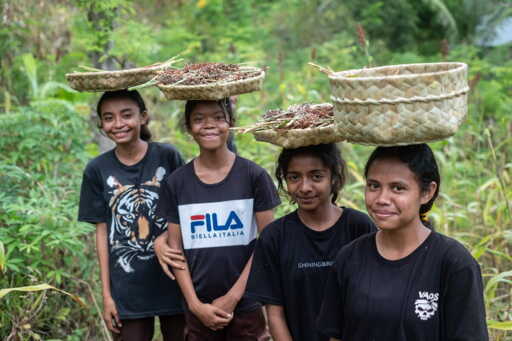LEMBATA ISLAND, Indonesia — A horde of children from Tapobali village rush out of Wulandoni 4 Junior High School to the sorghum field clasping blades and gathering starchy panicles into woven baskets. “We sell some of the harvest, and the rest is ingredients for baking,” Yudi Fridolin Atawolo, who teaches English at the school, told Mongabay Indonesia. “The proceeds are used to purchase school supplies and distributed to students.” Harvest time at this eastern Indonesia school project is a milestone for Ambrosia Ero and Hendrikus Bua Kilok. Three years ago, the pair helped establish Gerep Blamu Tapobali Wolowutun (Gebetan), a civil society organization of young people in Tapobali bringing practical solutions to safeguard food security in the village. “Ambrosia and I are trying to form a community,” Hendrikus, who is in his late 20s, told Mongabay Indonesia. “The focus is on local food-based agriculture and spring conservation as a way to protect and sustain our own village.” Tapobali is home to just 367 residents living across 553 hectares (1,366 acres) in three hamlets — Ina Tua Wato, Lelawiti and Walet — on the southern coast of Lembata Island in East Nusa Tenggara province. Students at Wulandoni 4 Public Middle School in Lembata during the sorghum harvest. Image by Nopri Ismi/Mongabay Indonesia. Access to Lewoleba, the nearest town and district seat, is expensive and inconvenient over uneven roads. “Transportation is often a barrier for people getting to Lewoleba,” elected village head Agutinus Bala Ledun told Mongabay Indonesia. “Not to mention the…This article was originally published on Mongabay
From Conservation news via this RSS feed


